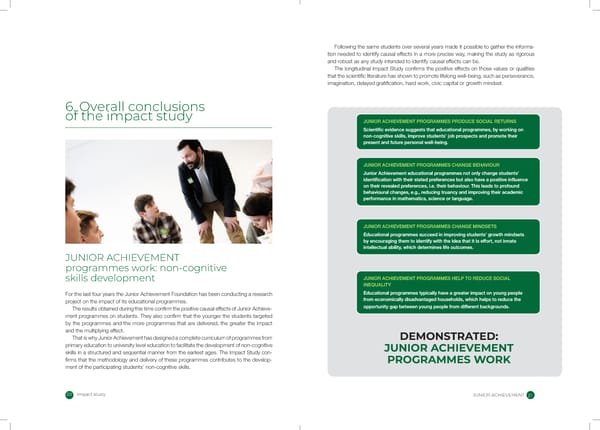Following the same students over several years made it possible to gather the informa- tion needed to identify causal effects in a more precise way, making the study as rigorous and robust as any study intended to identify causal effects can be. The longitudinal Impact Study con rms the positive effects on those values or qualities that the scienti c literature has shown to promote lifelong well-being, such as perseverance, imagination, delayed grati cation, hard work, civic capital or growth mindset. ׄ. Overall conclusions of the impact study JUNIOR ACHIEVEMENT PROGRAMMES PRODUCE SOCIAL RETURNS Scienti c evidence suggests that educational programmes, by working on non-cognitive skills, improve students’ job prospects and promote their present and future personal well-being. JUNIOR ACHIEVEMENT PROGRAMMES CHANGE BEHAVIOUR Junior Achievement educational programmes not only change students’ identi cation with their stated preferences but also have a positive in uence on their revealed preferences, i.e. their behaviour. This leads to profound behavioural changes, e.g., reducing truancy and improving their academic performance in mathematics, science or language. JUNIOR ACHIEVEMENT PROGRAMMES CHANGE MINDSETS Educational programmes succeed in improving students’ growth mindsets by encouraging them to identify with the idea that it is effort, not innate intellectual ability, which determines life outcomes. JUNIOR ACHIEVEMENT programmes work: non-cognitive skills development JUNIOR ACHIEVEMENT PROGRAMMES HELP TO REDUCE SOCIAL INEQUALITY For the last four years the Junior Achievement Foundation has been conducting a research Educational programmes typically have a greater impact on young people project on the impact of its educational programmes. from economically disadvantaged households, which helps to reduce the The results obtained during this time con rm the positive causal effects of Junior Achieve- opportunity gap between young people from different backgrounds. ment programmes on students. They also con rm that the younger the students targeted by the programmes and the more programmes that are delivered, the greater the impact and the multiplying effect. That is why Junior Achievement has designed a complete curriculum of programmes from DEMONSTRATED: primary education to university level education to facilitate the development of non-cognitive JUNIOR ACHIEVEMENT skills in a structured and sequential manner from the earliest ages. The Impact Study con- rms that the methodology and delivery of these programmes contributes to the develop- PROGRAMMES WORK ment of the participating students’ non-cognitive skills. ׀־٪ Impact study JUNIOR ACHIEVEMENT ׀ֿ
 Junior Achievement Foundation Page 10 Page 12
Junior Achievement Foundation Page 10 Page 12